The WW1 women's team who made footballing history

The Coalville Factory Munitions team are the only women's side to lift the Bass Charity Case in the competition's 134-year history
- Published
By day they toiled in dirty and dangerous factories, making shells for British forces fighting in World War One.
But after their shifts ended, a group of women from Coalville, in Leicestershire, took to football pitches to make sporting history.
The Coalville Munitions Girls Football Club remains the only women's side to have won the Bass Charity Vase regional competition in its 134-year history.
The little-known story of their unique triumph has now been told in a new BBC podcast - Lost in Time: The Coalville Munitions Girls.

The team's name sits on the 134-year-old trophy, along with other winners including Leicester Fosse, Derby County, Coventry City and WBA.
The team lifted the trophy in 1918, when women's sides took part because many men were away serving in the military.
"I don't think these women are widely regarded enough," said sports historian Prof Jean Williams.
"They were doing dirty and dangerous munitions work and then they didn't go home and rest.
"They said 'No, our boys are away at the front and we want to play football for charity.'"
Prof Williams said that when some national competitions were suspended during the war, the Bass Charity Vase was continued both to boost morale and raise money to support wounded soldiers returning from the battlefields.
Midlands clubs, including Leicester Fosse, Derby County, Stoke City, Coventry City, and Burton, usually competed for the vase, but women's sides stepped in in 1918.
After the Coalville Munitions Girls lifted the trophy that year, beating Shobnall Girls 3-1 in the final, the war ended and it reverted to a men's competition.
Prof Williams said women were effectively banned from playing football in 1921, when they were barred from playing in Football League grounds.

Relatives of the players said they were proud of what they had achieved.
BBC sports journalist Sophia Hartley and Leicester City Football Club historian Elsie Flynn have traced relatives of some of the munitions girls.
They included Peter Trudge, the son of Elizabeth Edwards, who played inside right.
Mr Trudge, who is now in his 80s, said he was proud of what she achieved.
"She was genuine, hardworking and friendly - small, very quick on her feet.
"The one thing I remember about her football is she said she only headed the ball once.
"From what I remember, [the team] won every match they played."
Follow BBC Leicester on Facebook, external, on X, external, or on Instagram, external. Send your story ideas to eastmidsnews@bbc.co.uk, external or via WhatsApp, external on 0808 100 2210.